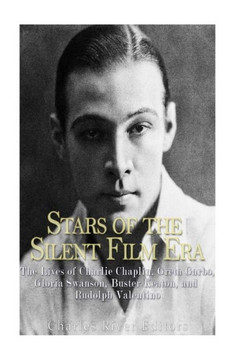*Includes pictures *Includes some of the actors' quotes about their movies *Includes online resources and a bibliography for further reading Only a select few actors become international stars in their time, but none had as unique a career as Charlie Chaplin. Chaplin was the first true film star, and he managed to do so even when films were still silent. He has been honored with too many awards to count, and the fact that his name remains instantly recognizable nearly a century after his first film is a testament to his influence. Even today, Chaplin's films are arguably more recognizable than those of perhaps any other actor or director; everyone is familiar with the famous "Tramp" costume and persona, and even the casual film enthusiast has likely seen films such as City Lights (1931) and Modern Times (1936). Chaplin is known for the singular blend of pathos and humor evinced by his films, and it is not uncommon for audiences to laugh and cry at alternate points of a Chaplin film, a trait that continues to endear audiences even to this day. In the 1920s, the burgeoning movie industry was starting to come into its own, and alongside actor and director Charlie Chaplin, Buster Keaton was at the peak of Hollywood. It's no surprise that Keaton was so effective in silent films, because he had been practicing comedy in his family's vaudeville acts as "The Little Boy Who Can't Be Damaged," becoming a popular performer by the age of 5. Indeed, his physical form of comedy, which initially involved having his father throwing him around the stage, translated well onto the screen, and some of his slapstick and other comic gags remain legendary even today, in part because Keaton practiced his own stunts. In fact, Keaton wrote his own material and was a crucial comic influence on acts like The Marx Brothers and The Three Stooges. Everything about Rudolph Valentino, from his body to the characters he played, was exotic. His career may have been abbreviated by his premature death at the age of 31, but Valentino popularized the (somewhat racist) stereotype of the "Latin lover" in Hollywood, and even his name was markedly more out of the ordinary than those of other actors. In an era dominated by hyper-masculine actors like Douglas Fairbanks, or comedians such as Charlie Chaplin and Buster Keaton, Valentino had a more ethnic and mysterious appeal, and he was lusted after by women to a degree that remains unsurpassed in the industry. The extent to which he captivated America can be seen in the response to his death; after passing away from a perforated ulcer in 1926, Ashton Trice and Samuel Holland note that his funeral "was one of the pop culture events of the century," and devastated women are alleged to have committed suicide out of heartbreak. Of all the great movie stars, there may be none more enigmatic than Greta Garbo, who remains internationally famous despite the fact her life and career raise more questions than answers. How did a Swedish actress with very little film acting experience in her native land arrive in the United States and achieve instant stardom? Most actresses had to wait years before they were offered starring roles in major films, yet Garbo was ushered to the front of the line and perched atop the MGM pantheon at a time in which it was the studio par excellence. It goes without saying that the most enduring image of Gloria Swanson is the famous shot of her in Sunset Boulevard (1950), head tilted backward, stating, "Alright, Mr. DeMille, I'm ready for my close up." Indeed, for many, the very mention of "Gloria Swanson" conjures the name of "Norma Desmond," her character in Sunset Boulevard, directed by Billy Wilder. That the shot of Desmond requesting her close-up remains indelibly imprinted in the minds of so many speaks in large part to the power of Sunset Boulevard, one of the most revered films of its times and the most famous film of Gloria Swanson's career.
| Author: Charles River Charles River Editors|Charles River |
| Publisher: CreateSpace Independent Publishing Platform |
| Publication Date: Mar 23, 2017 |
| Number of Pages: 256 pages |
| Language: English |
| Binding: Paperback |
| ISBN-10: 154487443X |
| ISBN-13: 9781544874432 |

